Impact of Entrepreneurship: Economic and Social Analysis
VerifiedAdded on 2022/10/07
|9
|2073
|15
Essay
AI Summary
This essay provides a comprehensive analysis of entrepreneurship, beginning with its definition and historical context, referencing key figures like Jean Baptiste Say and Joseph Schumpeter. It explores the positive impacts of entrepreneurship, such as economic growth, job creation, and market expansion, particularly through innovation. The essay also examines the negative impacts, including resource wastage, potential for business failure, and the challenges faced by entrepreneurs. It concludes that while challenges exist, the overall impact of entrepreneurship is overwhelmingly positive, contributing significantly to economic and social development. The essay draws upon various research papers and theories to support its arguments, providing a well-rounded understanding of the subject.
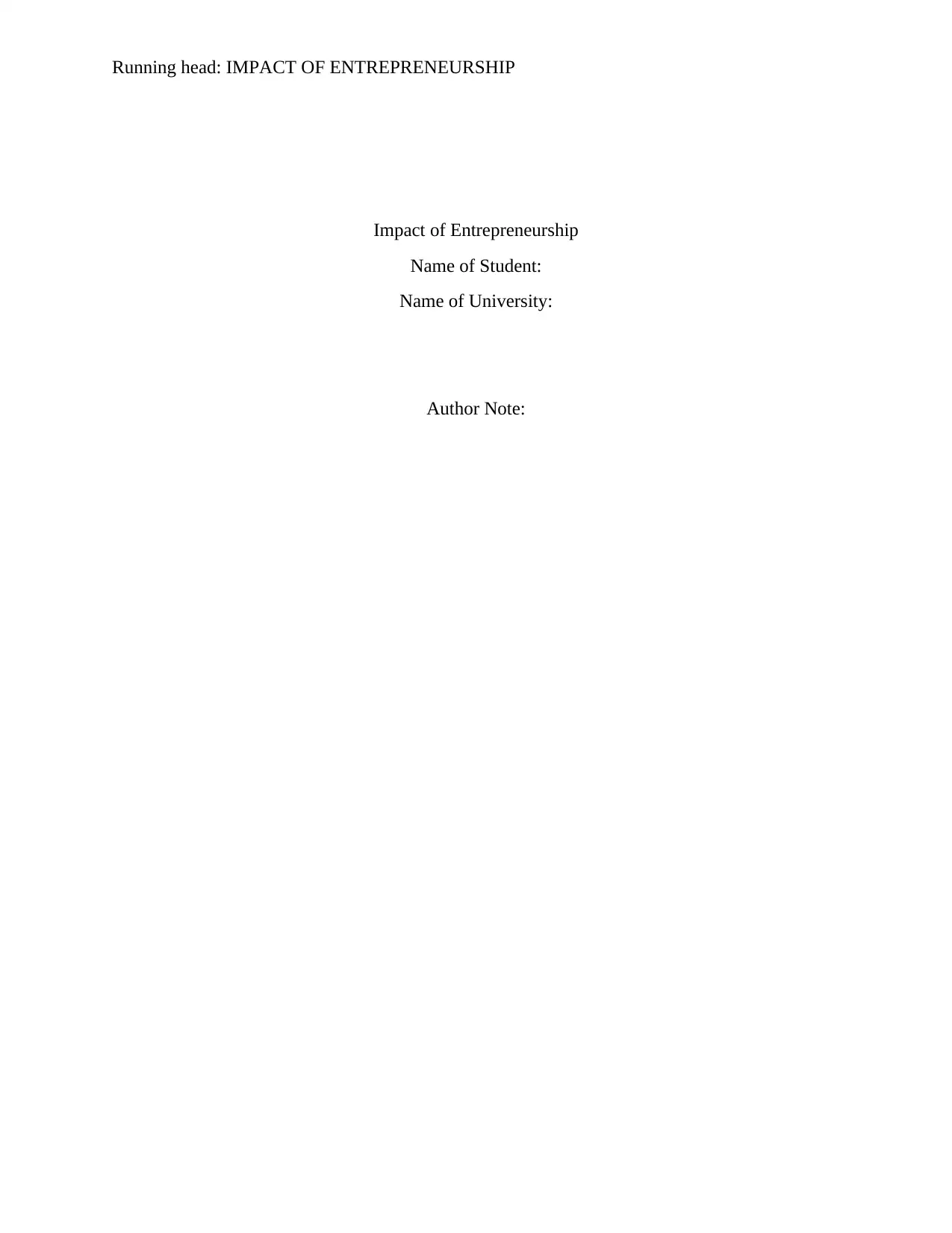
Running head: IMPACT OF ENTREPRENEURSHIP
Impact of Entrepreneurship
Name of Student:
Name of University:
Author Note:
Impact of Entrepreneurship
Name of Student:
Name of University:
Author Note:
Paraphrase This Document
Need a fresh take? Get an instant paraphrase of this document with our AI Paraphraser
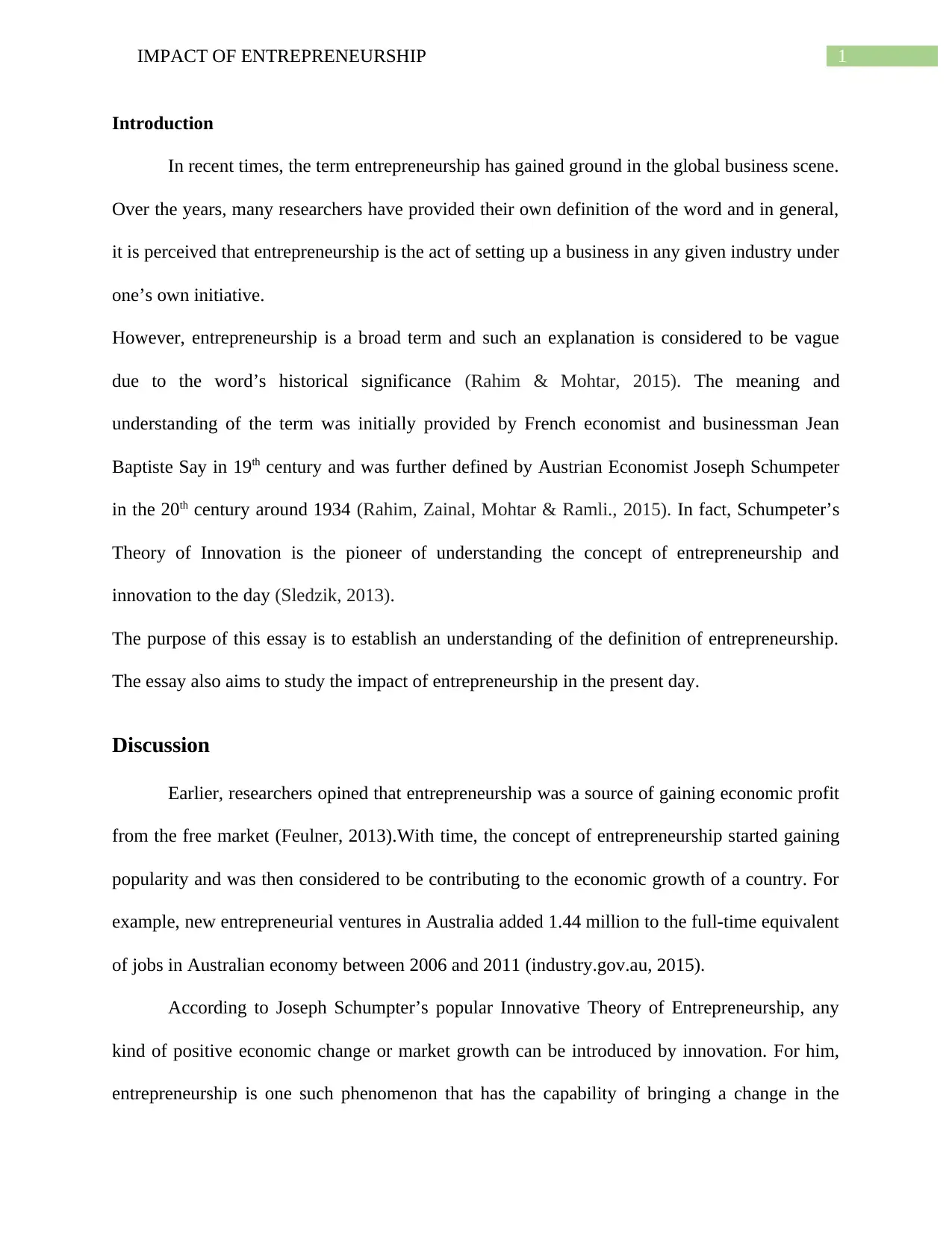
1IMPACT OF ENTREPRENEURSHIP
Introduction
In recent times, the term entrepreneurship has gained ground in the global business scene.
Over the years, many researchers have provided their own definition of the word and in general,
it is perceived that entrepreneurship is the act of setting up a business in any given industry under
one’s own initiative.
However, entrepreneurship is a broad term and such an explanation is considered to be vague
due to the word’s historical significance (Rahim & Mohtar, 2015). The meaning and
understanding of the term was initially provided by French economist and businessman Jean
Baptiste Say in 19th century and was further defined by Austrian Economist Joseph Schumpeter
in the 20th century around 1934 (Rahim, Zainal, Mohtar & Ramli., 2015). In fact, Schumpeter’s
Theory of Innovation is the pioneer of understanding the concept of entrepreneurship and
innovation to the day (Sledzik, 2013).
The purpose of this essay is to establish an understanding of the definition of entrepreneurship.
The essay also aims to study the impact of entrepreneurship in the present day.
Discussion
Earlier, researchers opined that entrepreneurship was a source of gaining economic profit
from the free market (Feulner, 2013).With time, the concept of entrepreneurship started gaining
popularity and was then considered to be contributing to the economic growth of a country. For
example, new entrepreneurial ventures in Australia added 1.44 million to the full-time equivalent
of jobs in Australian economy between 2006 and 2011 (industry.gov.au, 2015).
According to Joseph Schumpter’s popular Innovative Theory of Entrepreneurship, any
kind of positive economic change or market growth can be introduced by innovation. For him,
entrepreneurship is one such phenomenon that has the capability of bringing a change in the
Introduction
In recent times, the term entrepreneurship has gained ground in the global business scene.
Over the years, many researchers have provided their own definition of the word and in general,
it is perceived that entrepreneurship is the act of setting up a business in any given industry under
one’s own initiative.
However, entrepreneurship is a broad term and such an explanation is considered to be vague
due to the word’s historical significance (Rahim & Mohtar, 2015). The meaning and
understanding of the term was initially provided by French economist and businessman Jean
Baptiste Say in 19th century and was further defined by Austrian Economist Joseph Schumpeter
in the 20th century around 1934 (Rahim, Zainal, Mohtar & Ramli., 2015). In fact, Schumpeter’s
Theory of Innovation is the pioneer of understanding the concept of entrepreneurship and
innovation to the day (Sledzik, 2013).
The purpose of this essay is to establish an understanding of the definition of entrepreneurship.
The essay also aims to study the impact of entrepreneurship in the present day.
Discussion
Earlier, researchers opined that entrepreneurship was a source of gaining economic profit
from the free market (Feulner, 2013).With time, the concept of entrepreneurship started gaining
popularity and was then considered to be contributing to the economic growth of a country. For
example, new entrepreneurial ventures in Australia added 1.44 million to the full-time equivalent
of jobs in Australian economy between 2006 and 2011 (industry.gov.au, 2015).
According to Joseph Schumpter’s popular Innovative Theory of Entrepreneurship, any
kind of positive economic change or market growth can be introduced by innovation. For him,
entrepreneurship is one such phenomenon that has the capability of bringing a change in the
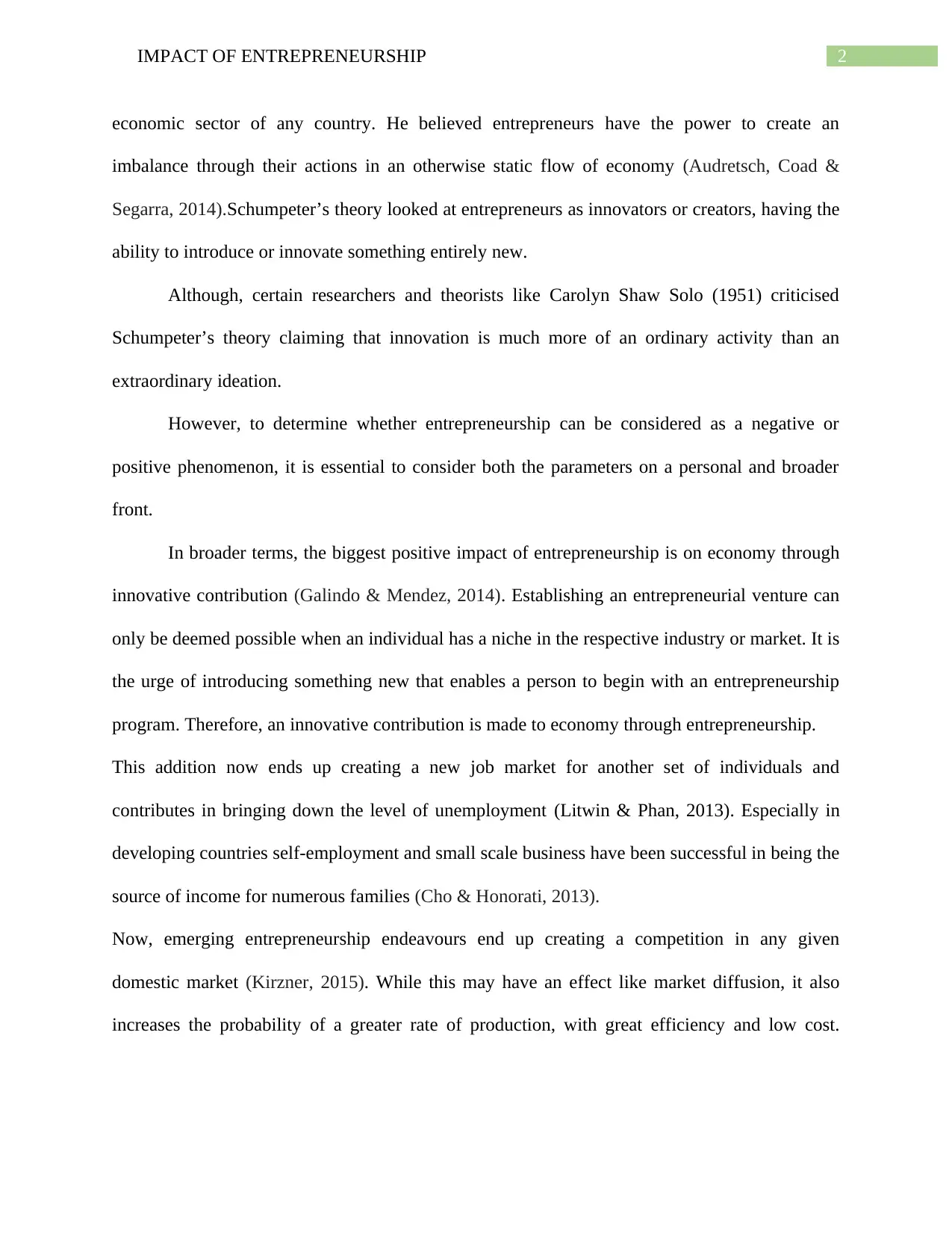
2IMPACT OF ENTREPRENEURSHIP
economic sector of any country. He believed entrepreneurs have the power to create an
imbalance through their actions in an otherwise static flow of economy (Audretsch, Coad &
Segarra, 2014).Schumpeter’s theory looked at entrepreneurs as innovators or creators, having the
ability to introduce or innovate something entirely new.
Although, certain researchers and theorists like Carolyn Shaw Solo (1951) criticised
Schumpeter’s theory claiming that innovation is much more of an ordinary activity than an
extraordinary ideation.
However, to determine whether entrepreneurship can be considered as a negative or
positive phenomenon, it is essential to consider both the parameters on a personal and broader
front.
In broader terms, the biggest positive impact of entrepreneurship is on economy through
innovative contribution (Galindo & Mendez, 2014). Establishing an entrepreneurial venture can
only be deemed possible when an individual has a niche in the respective industry or market. It is
the urge of introducing something new that enables a person to begin with an entrepreneurship
program. Therefore, an innovative contribution is made to economy through entrepreneurship.
This addition now ends up creating a new job market for another set of individuals and
contributes in bringing down the level of unemployment (Litwin & Phan, 2013). Especially in
developing countries self-employment and small scale business have been successful in being the
source of income for numerous families (Cho & Honorati, 2013).
Now, emerging entrepreneurship endeavours end up creating a competition in any given
domestic market (Kirzner, 2015). While this may have an effect like market diffusion, it also
increases the probability of a greater rate of production, with great efficiency and low cost.
economic sector of any country. He believed entrepreneurs have the power to create an
imbalance through their actions in an otherwise static flow of economy (Audretsch, Coad &
Segarra, 2014).Schumpeter’s theory looked at entrepreneurs as innovators or creators, having the
ability to introduce or innovate something entirely new.
Although, certain researchers and theorists like Carolyn Shaw Solo (1951) criticised
Schumpeter’s theory claiming that innovation is much more of an ordinary activity than an
extraordinary ideation.
However, to determine whether entrepreneurship can be considered as a negative or
positive phenomenon, it is essential to consider both the parameters on a personal and broader
front.
In broader terms, the biggest positive impact of entrepreneurship is on economy through
innovative contribution (Galindo & Mendez, 2014). Establishing an entrepreneurial venture can
only be deemed possible when an individual has a niche in the respective industry or market. It is
the urge of introducing something new that enables a person to begin with an entrepreneurship
program. Therefore, an innovative contribution is made to economy through entrepreneurship.
This addition now ends up creating a new job market for another set of individuals and
contributes in bringing down the level of unemployment (Litwin & Phan, 2013). Especially in
developing countries self-employment and small scale business have been successful in being the
source of income for numerous families (Cho & Honorati, 2013).
Now, emerging entrepreneurship endeavours end up creating a competition in any given
domestic market (Kirzner, 2015). While this may have an effect like market diffusion, it also
increases the probability of a greater rate of production, with great efficiency and low cost.
⊘ This is a preview!⊘
Do you want full access?
Subscribe today to unlock all pages.

Trusted by 1+ million students worldwide
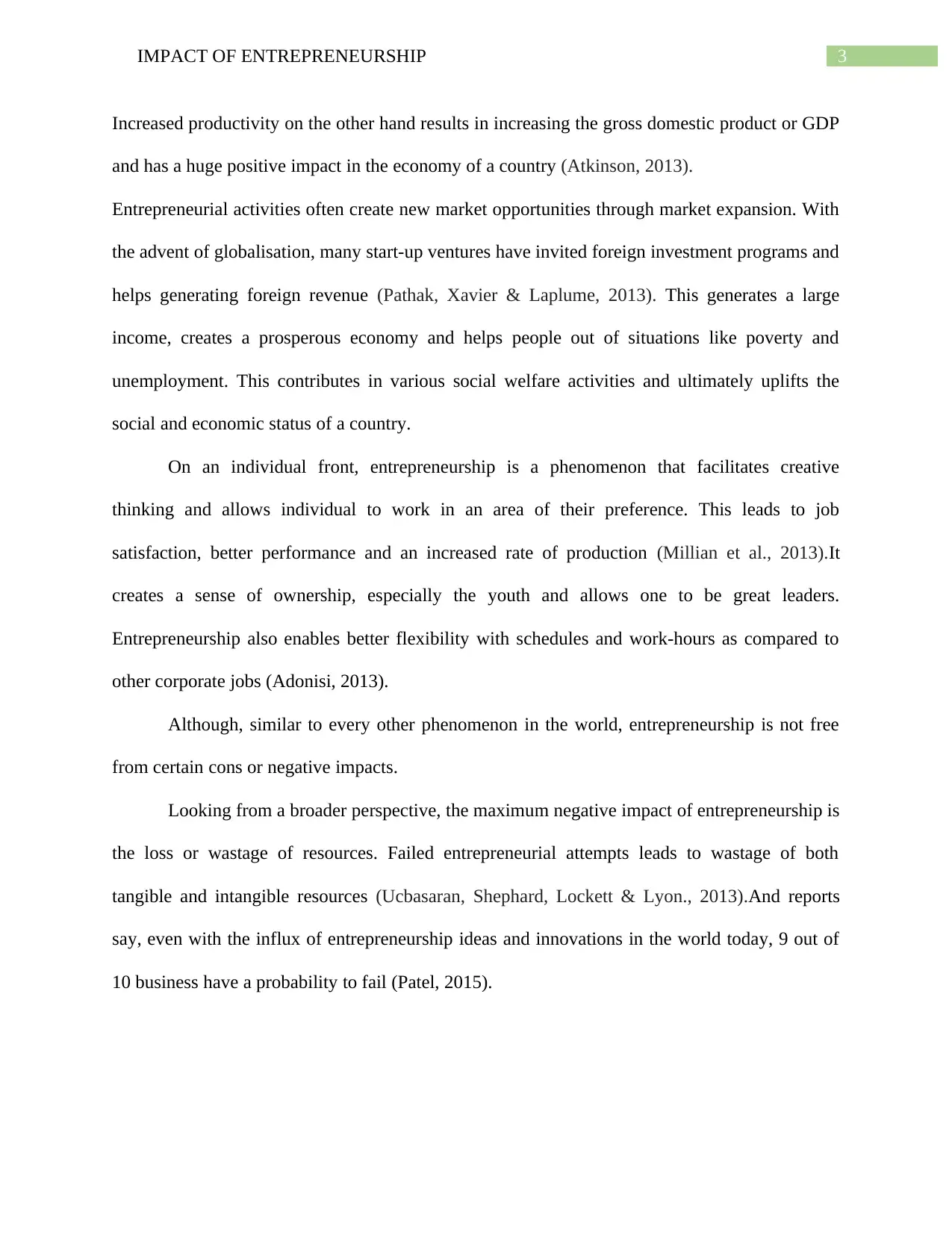
3IMPACT OF ENTREPRENEURSHIP
Increased productivity on the other hand results in increasing the gross domestic product or GDP
and has a huge positive impact in the economy of a country (Atkinson, 2013).
Entrepreneurial activities often create new market opportunities through market expansion. With
the advent of globalisation, many start-up ventures have invited foreign investment programs and
helps generating foreign revenue (Pathak, Xavier & Laplume, 2013). This generates a large
income, creates a prosperous economy and helps people out of situations like poverty and
unemployment. This contributes in various social welfare activities and ultimately uplifts the
social and economic status of a country.
On an individual front, entrepreneurship is a phenomenon that facilitates creative
thinking and allows individual to work in an area of their preference. This leads to job
satisfaction, better performance and an increased rate of production (Millian et al., 2013).It
creates a sense of ownership, especially the youth and allows one to be great leaders.
Entrepreneurship also enables better flexibility with schedules and work-hours as compared to
other corporate jobs (Adonisi, 2013).
Although, similar to every other phenomenon in the world, entrepreneurship is not free
from certain cons or negative impacts.
Looking from a broader perspective, the maximum negative impact of entrepreneurship is
the loss or wastage of resources. Failed entrepreneurial attempts leads to wastage of both
tangible and intangible resources (Ucbasaran, Shephard, Lockett & Lyon., 2013).And reports
say, even with the influx of entrepreneurship ideas and innovations in the world today, 9 out of
10 business have a probability to fail (Patel, 2015).
Increased productivity on the other hand results in increasing the gross domestic product or GDP
and has a huge positive impact in the economy of a country (Atkinson, 2013).
Entrepreneurial activities often create new market opportunities through market expansion. With
the advent of globalisation, many start-up ventures have invited foreign investment programs and
helps generating foreign revenue (Pathak, Xavier & Laplume, 2013). This generates a large
income, creates a prosperous economy and helps people out of situations like poverty and
unemployment. This contributes in various social welfare activities and ultimately uplifts the
social and economic status of a country.
On an individual front, entrepreneurship is a phenomenon that facilitates creative
thinking and allows individual to work in an area of their preference. This leads to job
satisfaction, better performance and an increased rate of production (Millian et al., 2013).It
creates a sense of ownership, especially the youth and allows one to be great leaders.
Entrepreneurship also enables better flexibility with schedules and work-hours as compared to
other corporate jobs (Adonisi, 2013).
Although, similar to every other phenomenon in the world, entrepreneurship is not free
from certain cons or negative impacts.
Looking from a broader perspective, the maximum negative impact of entrepreneurship is
the loss or wastage of resources. Failed entrepreneurial attempts leads to wastage of both
tangible and intangible resources (Ucbasaran, Shephard, Lockett & Lyon., 2013).And reports
say, even with the influx of entrepreneurship ideas and innovations in the world today, 9 out of
10 business have a probability to fail (Patel, 2015).
Paraphrase This Document
Need a fresh take? Get an instant paraphrase of this document with our AI Paraphraser
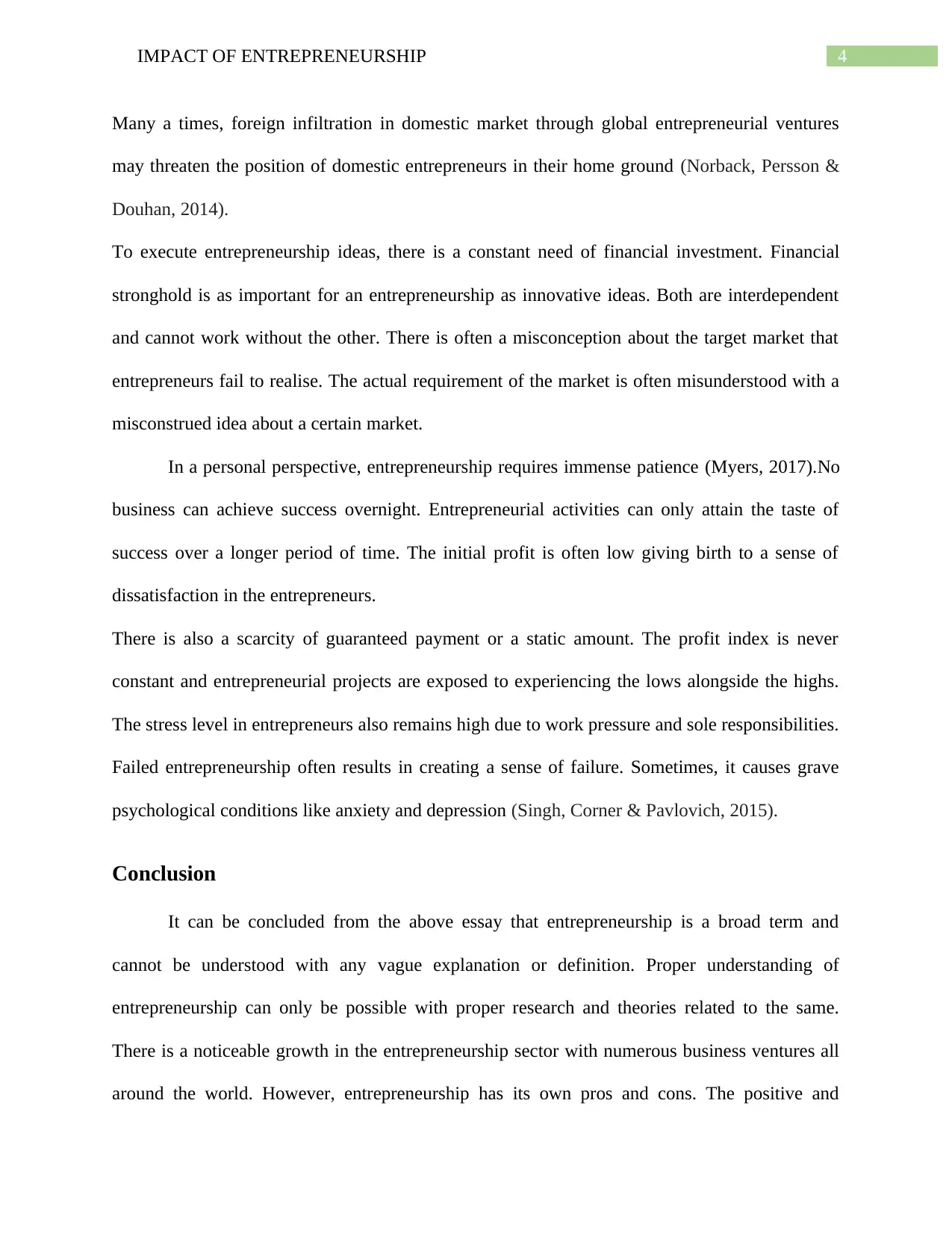
4IMPACT OF ENTREPRENEURSHIP
Many a times, foreign infiltration in domestic market through global entrepreneurial ventures
may threaten the position of domestic entrepreneurs in their home ground (Norback, Persson &
Douhan, 2014).
To execute entrepreneurship ideas, there is a constant need of financial investment. Financial
stronghold is as important for an entrepreneurship as innovative ideas. Both are interdependent
and cannot work without the other. There is often a misconception about the target market that
entrepreneurs fail to realise. The actual requirement of the market is often misunderstood with a
misconstrued idea about a certain market.
In a personal perspective, entrepreneurship requires immense patience (Myers, 2017).No
business can achieve success overnight. Entrepreneurial activities can only attain the taste of
success over a longer period of time. The initial profit is often low giving birth to a sense of
dissatisfaction in the entrepreneurs.
There is also a scarcity of guaranteed payment or a static amount. The profit index is never
constant and entrepreneurial projects are exposed to experiencing the lows alongside the highs.
The stress level in entrepreneurs also remains high due to work pressure and sole responsibilities.
Failed entrepreneurship often results in creating a sense of failure. Sometimes, it causes grave
psychological conditions like anxiety and depression (Singh, Corner & Pavlovich, 2015).
Conclusion
It can be concluded from the above essay that entrepreneurship is a broad term and
cannot be understood with any vague explanation or definition. Proper understanding of
entrepreneurship can only be possible with proper research and theories related to the same.
There is a noticeable growth in the entrepreneurship sector with numerous business ventures all
around the world. However, entrepreneurship has its own pros and cons. The positive and
Many a times, foreign infiltration in domestic market through global entrepreneurial ventures
may threaten the position of domestic entrepreneurs in their home ground (Norback, Persson &
Douhan, 2014).
To execute entrepreneurship ideas, there is a constant need of financial investment. Financial
stronghold is as important for an entrepreneurship as innovative ideas. Both are interdependent
and cannot work without the other. There is often a misconception about the target market that
entrepreneurs fail to realise. The actual requirement of the market is often misunderstood with a
misconstrued idea about a certain market.
In a personal perspective, entrepreneurship requires immense patience (Myers, 2017).No
business can achieve success overnight. Entrepreneurial activities can only attain the taste of
success over a longer period of time. The initial profit is often low giving birth to a sense of
dissatisfaction in the entrepreneurs.
There is also a scarcity of guaranteed payment or a static amount. The profit index is never
constant and entrepreneurial projects are exposed to experiencing the lows alongside the highs.
The stress level in entrepreneurs also remains high due to work pressure and sole responsibilities.
Failed entrepreneurship often results in creating a sense of failure. Sometimes, it causes grave
psychological conditions like anxiety and depression (Singh, Corner & Pavlovich, 2015).
Conclusion
It can be concluded from the above essay that entrepreneurship is a broad term and
cannot be understood with any vague explanation or definition. Proper understanding of
entrepreneurship can only be possible with proper research and theories related to the same.
There is a noticeable growth in the entrepreneurship sector with numerous business ventures all
around the world. However, entrepreneurship has its own pros and cons. The positive and
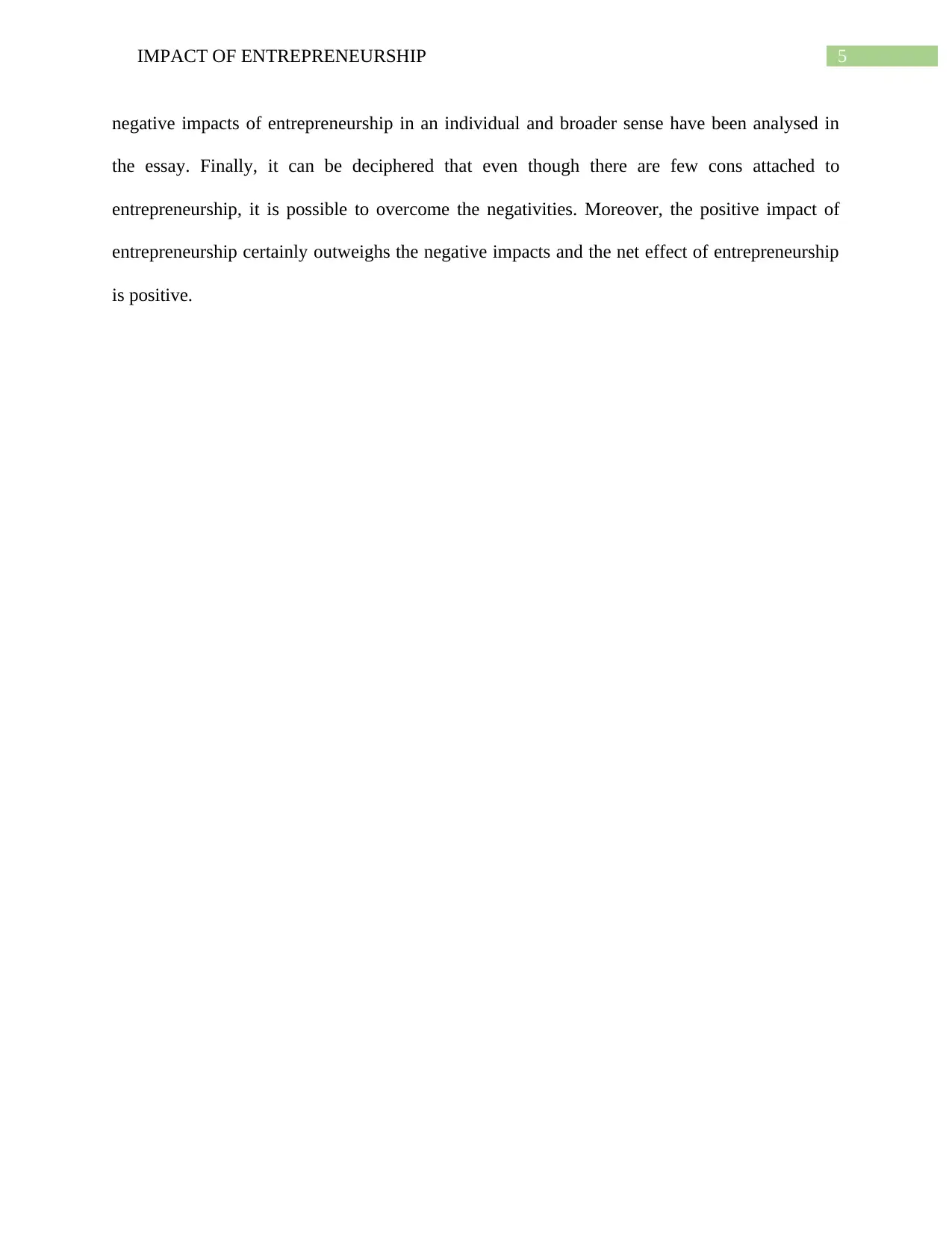
5IMPACT OF ENTREPRENEURSHIP
negative impacts of entrepreneurship in an individual and broader sense have been analysed in
the essay. Finally, it can be deciphered that even though there are few cons attached to
entrepreneurship, it is possible to overcome the negativities. Moreover, the positive impact of
entrepreneurship certainly outweighs the negative impacts and the net effect of entrepreneurship
is positive.
negative impacts of entrepreneurship in an individual and broader sense have been analysed in
the essay. Finally, it can be deciphered that even though there are few cons attached to
entrepreneurship, it is possible to overcome the negativities. Moreover, the positive impact of
entrepreneurship certainly outweighs the negative impacts and the net effect of entrepreneurship
is positive.
⊘ This is a preview!⊘
Do you want full access?
Subscribe today to unlock all pages.

Trusted by 1+ million students worldwide
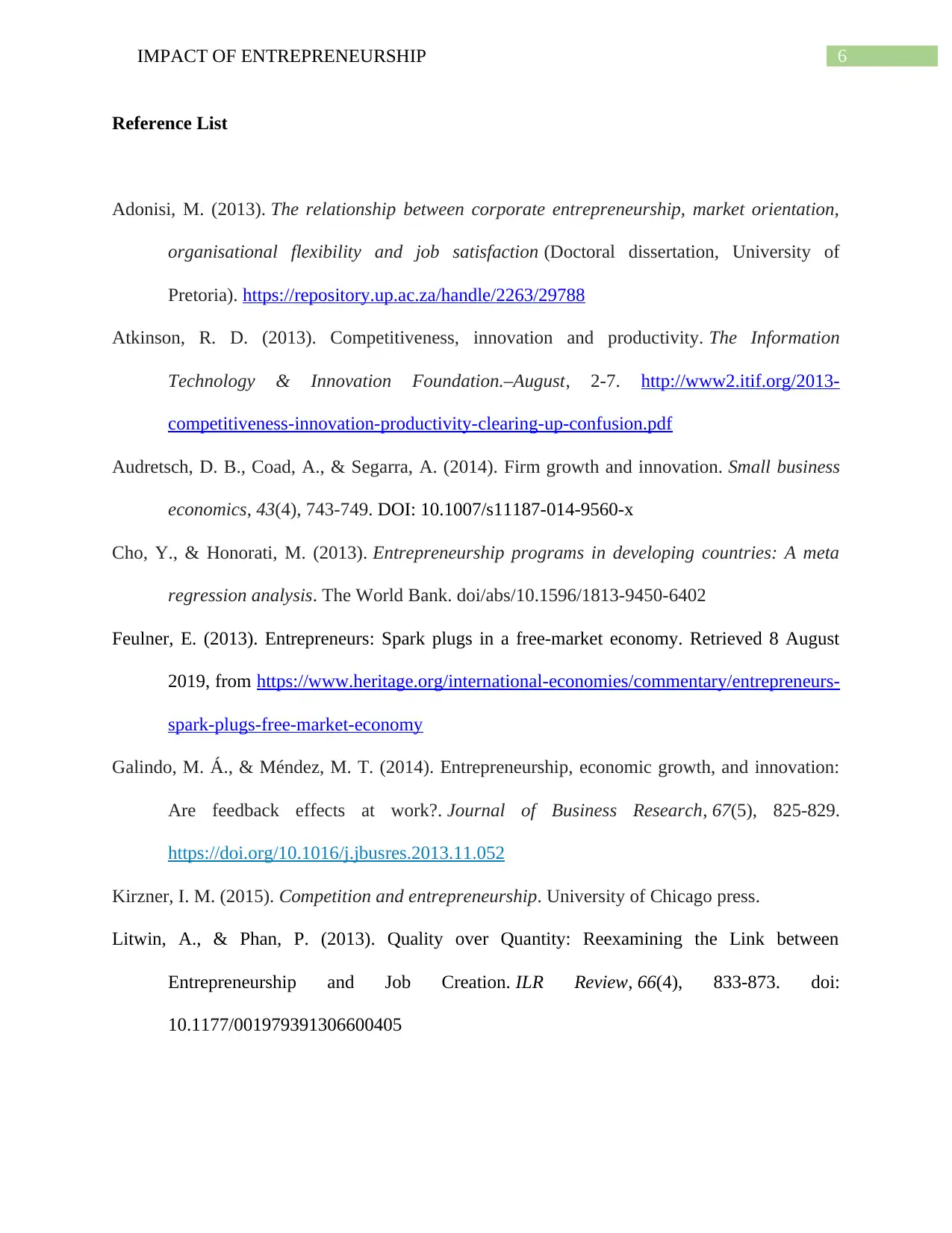
6IMPACT OF ENTREPRENEURSHIP
Reference List
Adonisi, M. (2013). The relationship between corporate entrepreneurship, market orientation,
organisational flexibility and job satisfaction (Doctoral dissertation, University of
Pretoria). https://repository.up.ac.za/handle/2263/29788
Atkinson, R. D. (2013). Competitiveness, innovation and productivity. The Information
Technology & Innovation Foundation.–August, 2-7. http://www2.itif.org/2013-
competitiveness-innovation-productivity-clearing-up-confusion.pdf
Audretsch, D. B., Coad, A., & Segarra, A. (2014). Firm growth and innovation. Small business
economics, 43(4), 743-749. DOI: 10.1007/s11187-014-9560-x
Cho, Y., & Honorati, M. (2013). Entrepreneurship programs in developing countries: A meta
regression analysis. The World Bank. doi/abs/10.1596/1813-9450-6402
Feulner, E. (2013). Entrepreneurs: Spark plugs in a free-market economy. Retrieved 8 August
2019, from https://www.heritage.org/international-economies/commentary/entrepreneurs-
spark-plugs-free-market-economy
Galindo, M. Á., & Méndez, M. T. (2014). Entrepreneurship, economic growth, and innovation:
Are feedback effects at work?. Journal of Business Research, 67(5), 825-829.
https://doi.org/10.1016/j.jbusres.2013.11.052
Kirzner, I. M. (2015). Competition and entrepreneurship. University of Chicago press.
Litwin, A., & Phan, P. (2013). Quality over Quantity: Reexamining the Link between
Entrepreneurship and Job Creation. ILR Review, 66(4), 833-873. doi:
10.1177/001979391306600405
Reference List
Adonisi, M. (2013). The relationship between corporate entrepreneurship, market orientation,
organisational flexibility and job satisfaction (Doctoral dissertation, University of
Pretoria). https://repository.up.ac.za/handle/2263/29788
Atkinson, R. D. (2013). Competitiveness, innovation and productivity. The Information
Technology & Innovation Foundation.–August, 2-7. http://www2.itif.org/2013-
competitiveness-innovation-productivity-clearing-up-confusion.pdf
Audretsch, D. B., Coad, A., & Segarra, A. (2014). Firm growth and innovation. Small business
economics, 43(4), 743-749. DOI: 10.1007/s11187-014-9560-x
Cho, Y., & Honorati, M. (2013). Entrepreneurship programs in developing countries: A meta
regression analysis. The World Bank. doi/abs/10.1596/1813-9450-6402
Feulner, E. (2013). Entrepreneurs: Spark plugs in a free-market economy. Retrieved 8 August
2019, from https://www.heritage.org/international-economies/commentary/entrepreneurs-
spark-plugs-free-market-economy
Galindo, M. Á., & Méndez, M. T. (2014). Entrepreneurship, economic growth, and innovation:
Are feedback effects at work?. Journal of Business Research, 67(5), 825-829.
https://doi.org/10.1016/j.jbusres.2013.11.052
Kirzner, I. M. (2015). Competition and entrepreneurship. University of Chicago press.
Litwin, A., & Phan, P. (2013). Quality over Quantity: Reexamining the Link between
Entrepreneurship and Job Creation. ILR Review, 66(4), 833-873. doi:
10.1177/001979391306600405
Paraphrase This Document
Need a fresh take? Get an instant paraphrase of this document with our AI Paraphraser
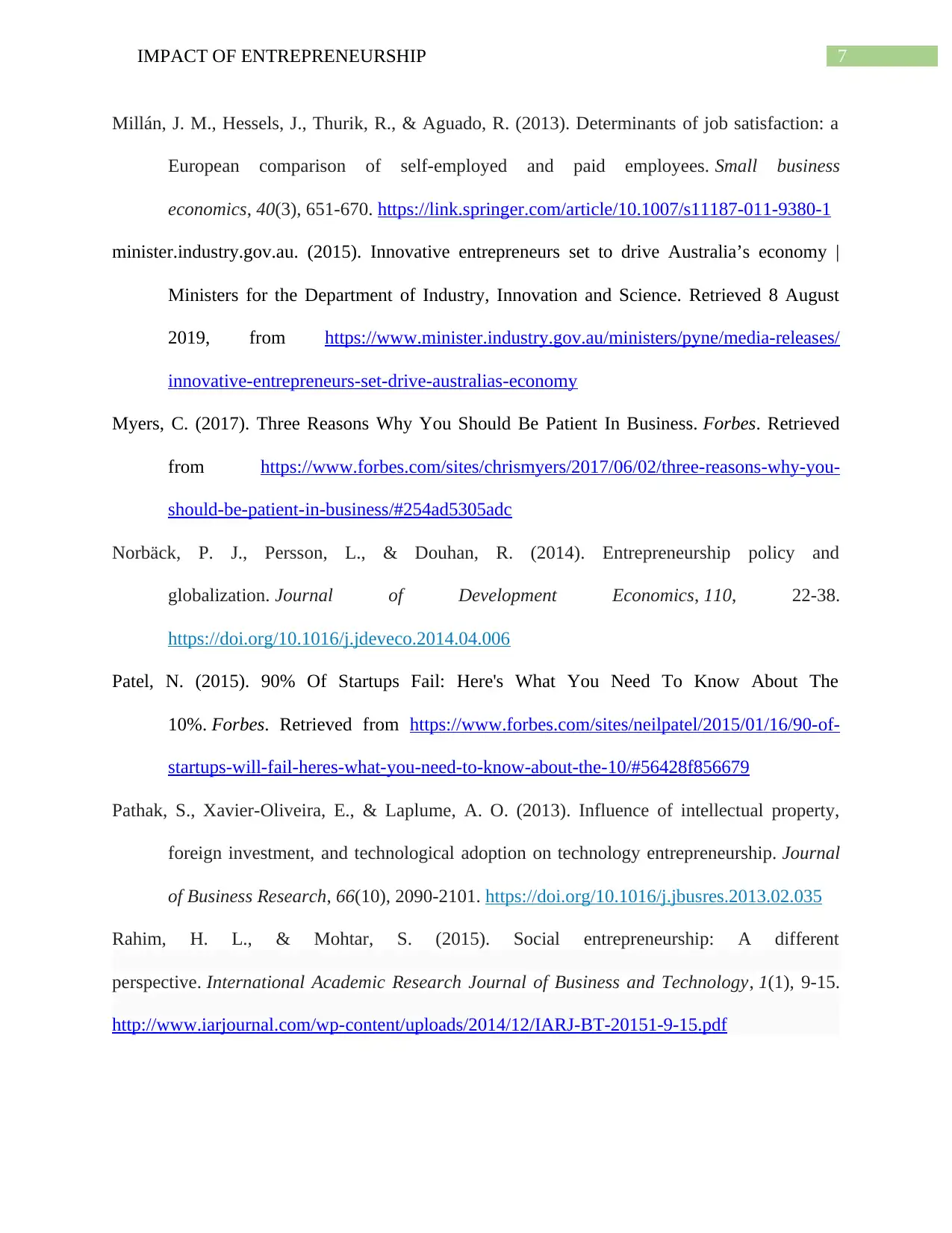
7IMPACT OF ENTREPRENEURSHIP
Millán, J. M., Hessels, J., Thurik, R., & Aguado, R. (2013). Determinants of job satisfaction: a
European comparison of self-employed and paid employees. Small business
economics, 40(3), 651-670. https://link.springer.com/article/10.1007/s11187-011-9380-1
minister.industry.gov.au. (2015). Innovative entrepreneurs set to drive Australia’s economy |
Ministers for the Department of Industry, Innovation and Science. Retrieved 8 August
2019, from https://www.minister.industry.gov.au/ministers/pyne/media-releases/
innovative-entrepreneurs-set-drive-australias-economy
Myers, C. (2017). Three Reasons Why You Should Be Patient In Business. Forbes. Retrieved
from https://www.forbes.com/sites/chrismyers/2017/06/02/three-reasons-why-you-
should-be-patient-in-business/#254ad5305adc
Norbäck, P. J., Persson, L., & Douhan, R. (2014). Entrepreneurship policy and
globalization. Journal of Development Economics, 110, 22-38.
https://doi.org/10.1016/j.jdeveco.2014.04.006
Patel, N. (2015). 90% Of Startups Fail: Here's What You Need To Know About The
10%. Forbes. Retrieved from https://www.forbes.com/sites/neilpatel/2015/01/16/90-of-
startups-will-fail-heres-what-you-need-to-know-about-the-10/#56428f856679
Pathak, S., Xavier-Oliveira, E., & Laplume, A. O. (2013). Influence of intellectual property,
foreign investment, and technological adoption on technology entrepreneurship. Journal
of Business Research, 66(10), 2090-2101. https://doi.org/10.1016/j.jbusres.2013.02.035
Rahim, H. L., & Mohtar, S. (2015). Social entrepreneurship: A different
perspective. International Academic Research Journal of Business and Technology, 1(1), 9-15.
http://www.iarjournal.com/wp-content/uploads/2014/12/IARJ-BT-20151-9-15.pdf
Millán, J. M., Hessels, J., Thurik, R., & Aguado, R. (2013). Determinants of job satisfaction: a
European comparison of self-employed and paid employees. Small business
economics, 40(3), 651-670. https://link.springer.com/article/10.1007/s11187-011-9380-1
minister.industry.gov.au. (2015). Innovative entrepreneurs set to drive Australia’s economy |
Ministers for the Department of Industry, Innovation and Science. Retrieved 8 August
2019, from https://www.minister.industry.gov.au/ministers/pyne/media-releases/
innovative-entrepreneurs-set-drive-australias-economy
Myers, C. (2017). Three Reasons Why You Should Be Patient In Business. Forbes. Retrieved
from https://www.forbes.com/sites/chrismyers/2017/06/02/three-reasons-why-you-
should-be-patient-in-business/#254ad5305adc
Norbäck, P. J., Persson, L., & Douhan, R. (2014). Entrepreneurship policy and
globalization. Journal of Development Economics, 110, 22-38.
https://doi.org/10.1016/j.jdeveco.2014.04.006
Patel, N. (2015). 90% Of Startups Fail: Here's What You Need To Know About The
10%. Forbes. Retrieved from https://www.forbes.com/sites/neilpatel/2015/01/16/90-of-
startups-will-fail-heres-what-you-need-to-know-about-the-10/#56428f856679
Pathak, S., Xavier-Oliveira, E., & Laplume, A. O. (2013). Influence of intellectual property,
foreign investment, and technological adoption on technology entrepreneurship. Journal
of Business Research, 66(10), 2090-2101. https://doi.org/10.1016/j.jbusres.2013.02.035
Rahim, H. L., & Mohtar, S. (2015). Social entrepreneurship: A different
perspective. International Academic Research Journal of Business and Technology, 1(1), 9-15.
http://www.iarjournal.com/wp-content/uploads/2014/12/IARJ-BT-20151-9-15.pdf
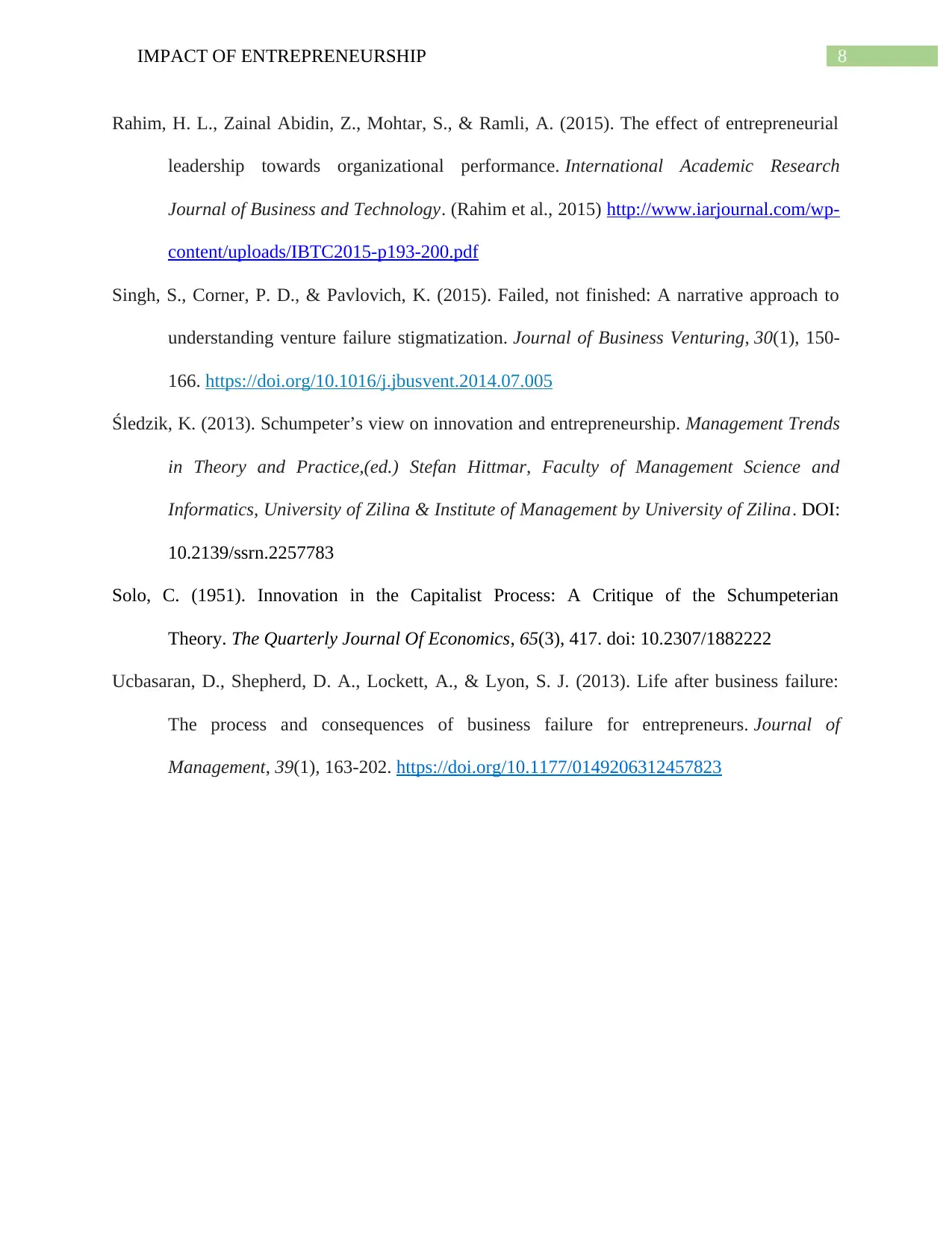
8IMPACT OF ENTREPRENEURSHIP
Rahim, H. L., Zainal Abidin, Z., Mohtar, S., & Ramli, A. (2015). The effect of entrepreneurial
leadership towards organizational performance. International Academic Research
Journal of Business and Technology. (Rahim et al., 2015) http://www.iarjournal.com/wp-
content/uploads/IBTC2015-p193-200.pdf
Singh, S., Corner, P. D., & Pavlovich, K. (2015). Failed, not finished: A narrative approach to
understanding venture failure stigmatization. Journal of Business Venturing, 30(1), 150-
166. https://doi.org/10.1016/j.jbusvent.2014.07.005
Śledzik, K. (2013). Schumpeter’s view on innovation and entrepreneurship. Management Trends
in Theory and Practice,(ed.) Stefan Hittmar, Faculty of Management Science and
Informatics, University of Zilina & Institute of Management by University of Zilina. DOI:
10.2139/ssrn.2257783
Solo, C. (1951). Innovation in the Capitalist Process: A Critique of the Schumpeterian
Theory. The Quarterly Journal Of Economics, 65(3), 417. doi: 10.2307/1882222
Ucbasaran, D., Shepherd, D. A., Lockett, A., & Lyon, S. J. (2013). Life after business failure:
The process and consequences of business failure for entrepreneurs. Journal of
Management, 39(1), 163-202. https://doi.org/10.1177/0149206312457823
Rahim, H. L., Zainal Abidin, Z., Mohtar, S., & Ramli, A. (2015). The effect of entrepreneurial
leadership towards organizational performance. International Academic Research
Journal of Business and Technology. (Rahim et al., 2015) http://www.iarjournal.com/wp-
content/uploads/IBTC2015-p193-200.pdf
Singh, S., Corner, P. D., & Pavlovich, K. (2015). Failed, not finished: A narrative approach to
understanding venture failure stigmatization. Journal of Business Venturing, 30(1), 150-
166. https://doi.org/10.1016/j.jbusvent.2014.07.005
Śledzik, K. (2013). Schumpeter’s view on innovation and entrepreneurship. Management Trends
in Theory and Practice,(ed.) Stefan Hittmar, Faculty of Management Science and
Informatics, University of Zilina & Institute of Management by University of Zilina. DOI:
10.2139/ssrn.2257783
Solo, C. (1951). Innovation in the Capitalist Process: A Critique of the Schumpeterian
Theory. The Quarterly Journal Of Economics, 65(3), 417. doi: 10.2307/1882222
Ucbasaran, D., Shepherd, D. A., Lockett, A., & Lyon, S. J. (2013). Life after business failure:
The process and consequences of business failure for entrepreneurs. Journal of
Management, 39(1), 163-202. https://doi.org/10.1177/0149206312457823
⊘ This is a preview!⊘
Do you want full access?
Subscribe today to unlock all pages.

Trusted by 1+ million students worldwide
1 out of 9
Related Documents
Your All-in-One AI-Powered Toolkit for Academic Success.
+13062052269
info@desklib.com
Available 24*7 on WhatsApp / Email
![[object Object]](/_next/static/media/star-bottom.7253800d.svg)
Unlock your academic potential
Copyright © 2020–2026 A2Z Services. All Rights Reserved. Developed and managed by ZUCOL.




